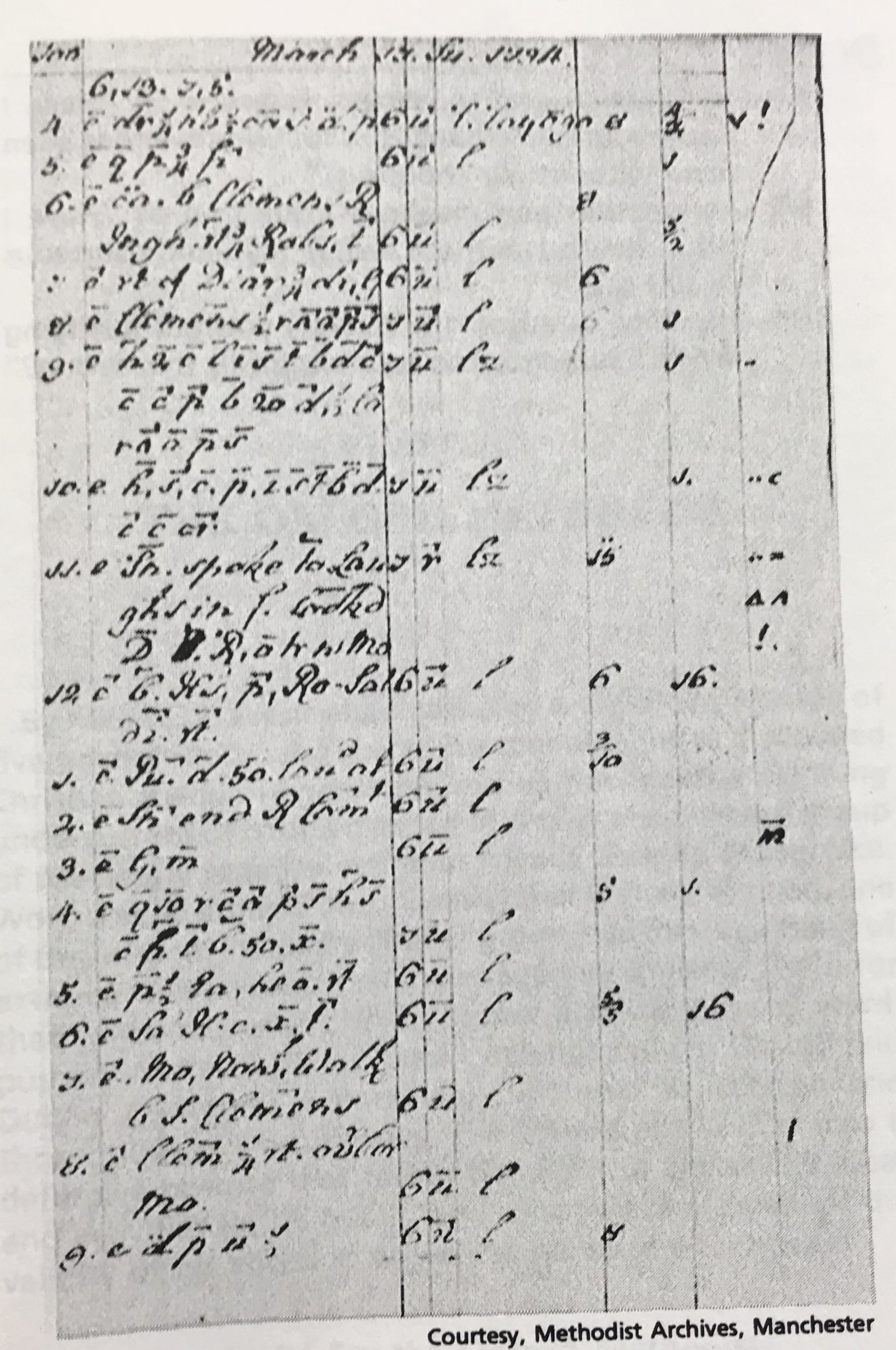Keeping Track of Your Time
/In my sermon on Sunday, I challenged y’all to do a personal time evaluation. I saw a lot of blank stares when I talked about it, so let me explain what I was talking about:
John Wesley’s diary from his time in Georgia; note the shorthand he uses to make his entries briefer.
Start by taking a blank piece of paper. Write the time you usually get up in the morning at the top on the left of the page. Then go down the side of the page, listing each hour of the day until the time you usually go to bed.
My page, for example, would have 6 am at the top, with 7, 8, 9 and so on down the side until 10, which would be the last entry.
Then make copies of that page so that you have a week’s worth of pages.
Throughout each day of the week, keep a record of how you spend each hour of the day. Use whatever notation scheme you like. I actually write actual times in which I started a task, then the time when I did something else.
Don’t worry — this is only for your eyes. You don’t have to let anybody else see it. This is only for self-evaluation.
When the week is over, spend some time looking over how your time was spent and reflect. If it’s helpful, tally up the number of hours you spent in the big categories: work, sleep, family, rest and relaxation, church, etc.
Then compare those numbers and look for the surprises. Do you spend more time working than you thought? Are you getting enough sleep? How much time did you spend with your family?
Obviously, I want to encourage you to think about how much time you spent intentionally working on your discipleship. Did you spend time with God in prayer? Did you do any spiritual reading, either of the Bible or some other book that deepened your understanding of God? Did you have any deep conversations with others about things that really matter?
At this point, you may decide to stop reading this column in anger. “What right does he have to question my use of time?” you might think.
The truth is that the Methodist heritage contains a strong strain of Christian time management.
John Wesley was particularly concerned that he and his Methodist preachers managed their time well. In fact, he left behind a set of questions used to determine whether someone was fit to be of service. We call them the Historic Questions and use them in “examining” ordination candidates. The last of these questions, asked of every ordinand, reads like this:
Will you observe the following directions? a) Be diligent. Never be unemployed. Never be triflingly employed. Never trifle away time; neither spend any more time at any one place than is strictly necessary. b) Be punctual. Do everything exactly at the time. And do not mend our rules, but keep them; not for wrath, but for conscience’ sake.
If a preacher couldn’t honestly answer, “Yes,” Wesley wouldn’t commission him. And neither will our bishops.
A page from Wesley’s Oxford Diary; the entry for March 17, 1734.
Wesley himself kept to a very rigid schedule, as evidenced by the fact that he kept a detailed diary throughout his life. He didn’t do this because he wanted to leave behind a record of everything he had done; this was part of his own spiritual journey, part of the way he hoped to develop a “holy” lifestyle.
While attending Oxford, Wesley developed a rather intricate method for determining how well he was doing spiritually. First, he made up a list of 16 questions about his spiritual life. For example, one question was, “Have I prayed with fervor, by myself and at Chapel?” Another was, “Have I thought or spoken unkindly of or to anyone?”
Then he listed the hours of the day down the left side of his journal page, and made four columns across the top. In the first box, he wrote the details of what he had done at each hour. In the second column, he kept a record of his “Temper of Devotion,” which he kept on a scale of 1 to 9, with 9 being the most religiously devout and focused. The third column was labeled “Resolutions Broken,” in which he wrote down the number of any of the questions he had not kept; the fourth column was for “Resolutions Kept,” in which he wrote down the questions to which he could answer “Yes.”
If that sounds like a lot of work, it was. Wesley was unable to keep that up over his lifetime. However, it may also sound like an Obsessive-Compulsive Disorder! I like to think that Wesley gradually came to understand the meaning of grace and accepted the idea that he didn’t have to be perfect in order to be loved.
I’m not at all commending Wesley’s diary style to you. I don’t do it, and wouldn’t want to.
But Wesley certainly understood that the way we spend our time says something significant about our spiritual condition. What we do with our time says a lot about who we are, what we think of God, and how seriously we take our faith.
Let me close with this quote from Father Richard Rohr:
Time is exactly what we do not have. What decreases in a culture of affluence is precisely and strangely time—along with wisdom and friendship. These are the very things that the human heart was created for, that the human heart feeds on and lives for. No wonder we are producing so many depressed, unhealthy and even violent people.
What will you do to allow yourself to enjoy the gift of time once again?





